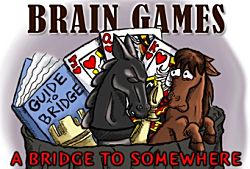Outside the Box: Brain Games — A bridge to somewhere
October 20, 2008,by Bob Carson
Editor’s Note: The USTA Web site is pleased to present freelance writer Bob Carson and his popular “Outside the Box” features. This monthly series is a menu of outlandish proposals presented with a wink — but the purpose behind them is serious.

Bob Carson
In the 1930s, card playing was wildly popular. The most popular and cerebral card game was contract bridge. Bridge was more popular than baseball. By the 1940s bridge was played in 44 percent of American homes. Bridge books were vacuumed off shelves. Rich, famous, poor and notorious all were swept up by the tsunami of the infinitely complex, addictive game. Titans of the game of Bridge, Ely Culbertson, Charles Goren and Harold Vanderbilt were names that reverberated across the land. For most alive, it is hard to imagine the popularity contract bridge once commanded.
Today, Bridge, like Chess and harness racing has fallen far and fast. All three depend on intelligence, patience, practice, determination, study, socialization and time. All three continue to be pushed off stage by hip, quick, imitators or replacements.Today the average age of the ACBL (American Contract Bridge League) is 68 and rising rapidly. Efforts to promote the game to new generations in schools and on the Internet have shown little traction. Bridge, like Chess and harness racing will continue, championed by smaller and smaller groups of hard-core aficionados — but the future looks bleak for pastimes that rely on deep thinking, a heavy investment of time and socialization.
Jeff Bayone, Chess player, Bridge player, teacher, and co-owner of the Manhattan Bridge Club said, “It takes 30 minutes to teach Texas Hold’em (poker), and in one hour you can be as good as 50 percent of the people playing the game. In Bridge, you need a dozen lessons — at two hours apiece — just to learn HOW to play!”
The games have not changed. Harness racing, Bridge and Chess remain every bit as fascinating and maddening as ever.
Warren Buffett, financial whiz and Bridge player (often partnering Bill Gates) stated, “Bridge is such a sensational game that I wouldn’t mind being in jail if I had three cellmates who were decent players and were willing to keep the game going 24 hours a day.”

Autumn Schmidt graphic
The audiences playing the brain games have changed. Where once these pastimes were mainstream, more and more they consist of participants that are obsessively like-minded or remnants of bygone eras.
For the past two decades, Zia Mahmood has been the face of Bridge. Think of him as the John Campbell of Bridge. The dashing Pakistani international champion is famous enough needs only his first name as he leads a James Bond life using Bridge as his calling card. Zia is a youthful 60, a multi-time champion, extremely popular and well spoken. And he knows his game is in trouble. He is a man who does not dwell on the past but looks to the future.
“Bridge is not in jeopardy of dying out, but it is certainly in jeopardy of becoming very particular and specialized, which is a bad thing.”
Despite being the ambassador of Bridge, Zia is a radical. He has a long list of ideas that are exciting, dramatic and revolutionary for his game — but like horse racing, changes are glacier-like and he does not expect them to happen.
“The players, as a whole, are well-meaning but lazy. They don’t do anything. And the vested interests in the management of Bridge are particularly uninterested in things; usually bureaucrats who want to maintain their positions and live their usual lives. They are not motivated.”
For harness racing, discovering parallel problems in other thinking games is of little consolation. Being in the same leaking boat does not get us to the Promised Land. Ignoring these trends is absurd. Whining is not progress. Ceasing efforts to move horse racing forward is illogical. Quite the contrary, this is a critical time for promotion of our sport. The only direction we can march is forward, and as we march we must always remember that we have a great game.
Our numbers may not be good these days but brain sports have a few assets that cross country skiing, freestyle bicycling, football and skydiving promoters desire:
- Tenacity. People who latch onto brain games like Chess or Bridge or horse racing tend to last, and last. There is an addictive quality to the puzzles in these complex activities. They can never be conquered, and you never stop learning. Once you become a horse racing handicapper, there is a good chance you will be a lifer.
- Age. While it is true that the demographics for these “blasts from the past” are skewed upwards, these elderly audiences are living longer and longer, and unlike snowboarding or bungee jumping, you can play until your last day. Elder folks often have time and money to spend.
- Computer transfer. The perfect formula has not been found but all three of these brain games have had somewhat of a resurgence on the Internet. Bridge and Chess can be played constantly on the computer. Horse racing finds much of the wagering moving on-line. This is a sword that cuts both ways. The interaction and socialization that were the foundations of these titans are lost behind the anonymity of a monitor, however, some converts will be made.
- International Interest. Chess, Bridge and horse racing have never been limited to America but globalization and the Internet offer nations of people that will have the opportunity to sample our games.
- Money. The people who become engrossed in brain games are people high on the economic scale (Bill Gates, Arabian Sheiks, Warren Buffett, CEOs, politicians). Smart people enjoy smart games.
- Exclusivity. Many of us take smug satisfaction believing that we have discovered something that the masses are missing. Deep down, a successful race handicapper, horse owner, Bridge player or grand master realizes that he is a member of an elite club.
- Flexibility. While baseball and football rarely change the game, brain sports are subject to variations that often find root. For example, just as horse racing has different types (harness, thoroughbred, quarter horse), so does Bridge. Zia is a proponent of Rubber Bridge, a money game of head to head competition, however he plays Duplicate or Contract Bridge with equal skill. Speed Chess or Lightning Chess is a new hybrid. Bobby Fisher was pushing a random version of Chess where the pieces did not start in normal positions. Hybrids of horse racing are possible.
- Medicinal. Studies show that people who engage in consistent, demanding regular mental activities such as playing cards, Chess and horse handicapping can reap physical and mental benefits. Studies in postponing Alzheimer’s are particularly interesting.
So, despite declining numbers, all is not bleak. Fashions, governments and nations all have peaks and valleys. While it is true that, as a whole, brain games are in a valley, this does not make us lepers or untouchables, quite the opposite. Reading these words indicates you have found a pastime that is worthwhile. You have found a game that takes brains, patience and time. If you are a harness racing fan, Chess player or Bridge player, you may no longer be in the mainstream, but you are in good company.
Spread the word.
